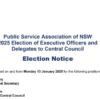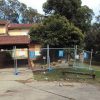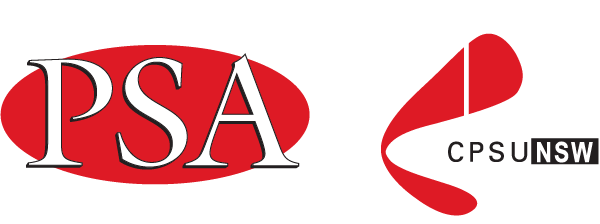Annual Conference struck an optimistic tone with a new government willing to listen to union voices.
Under the banner of A Fresh Start for the Public Sector, the PSA CPSU NSW Annual Conference mixed its usual business with an air of hope that things were different since the 2023 state election.
For the first time in a dozen years, the union was “inside the tent”, with not only an appearance from the State Premier, but also two of his Ministers who laid out plans for the PSA CPSU NSW to have a greater say in the way their departments operated.
Annual Conference was preceded by Country Conference, where Assistant General Secretary Troy Wright praised the involvement of regional members in the Public Sector Needs a Pay Rise industrial action.
“It was the reciprocal rallies across the state that demonstrated that this was not a metropolitan issue but a statewide one,” he said, mentioning an unexpectedly large turnout in Newcastle and the determination of members in Broken Hill to gather and rally.
Mr Wright also mentioned how the 2023 State Election meant “regional NSW was no longer blanket-covered by a National Party that takes you for granted”.
Industrial action at the Clarence Correctional Centre in Grafton, he added, showed the importance of standing up to multinationals that “enter a regional community, take all the local labour and don’t contribute to the community”. He praised the campaign that involved not just union members, but a business community suffering when local workers were not paid enough to buy their products.
The result was an Enterprise Agreement with wages 20 per cent higher than the first offer, as well as other improved conditions.
Mr Wright said the importance of regional NSW to the PSA CPSU NSW was underscored by the high growth of numbers in country NSW.
Regional Organiser Stephen Mears said he knew of members leaving the state for better-paying positions interstate, and hoped the new government would make the NSW Public Sector a more appealing place to work.






“It will take vigilance from all of us to keep our issues front of mind,” he said.
Talking initially in Gadigal, Chair of the Metropolitan Local Aboriginal Land Council, Nathan Moran, opened the main conference the following day.
Mr Moran said with a new State Government he hoped “we get to a fresh start and honouring and respecting what public servants do”.
“What sort of leaders freeze the right to earn money?” he added, alluding to the wages cap that had done such damage to members’ take-home pay and had emerged as a major issue in the election campaign.
The next speaker was PSA CPSU NSW President Nicole Jess, who said while it was good to have a Labor State Government for the first time in 12 years, not everything will be plain sailing. Ms Jess reminded the conference that it was Labor that privatised the gaol in Parklea, and was therefore not surprised she had been contacted by members worried it will be business as usual under the new Premier.
“We want a new regime where the public sector is respected,” she said.
General Secretary Stewart Little said Conference is about delegates and the critical role they play, particularly while members find themselves in a cost-of-living crisis and inflation that former Prime Minister Scott Morrison and former NSW Premier Dominic Perrottet “could not deal with”. He said this inability to rise to the challenge of inflation resulted in their election defeats.
Mr Little said an issue for the new Labor Government was to fill frontline jobs that are vacant due to wage restraint.
“Right across the Public Sector we have vacancies – we can’t fill jobs,” he said. “We will get a pay rise and it will be free of the salary cap.
“As a union we fight for our members, we don’t step back.”
Mr Little said the union could look back with pride at achievements such as campaigning to overturn the state government and “converting over 6000 school staff into permanent jobs”.
The room was packed for the appearance of Premier Chris Minns, marking the 61st day since his election in front of members of a union that worked hard to defeat his opponent.
Mr Minns acknowledged the PSA CPSU NSW and its advocacy for the state’s essential workers, as well as its work defeating the former government.
“The previous government did not understand public service in this state and did not understand why young people would join the Public Sector to serve this state,” he said, citing the vital roles members such as Prison Officers and School Support Staff played in NSW.
“It comes down to a basic lack of respect.
“There would not be a school that could operate effectively in this state without Administrative Officers,” added Mr Minns, who himself is the son of a school teacher.





The Premier said that union leaders were now invited into Parliament House, rather than left outside the decision-making circle, as had been the case under the Liberal National Coalition.
“We don’t think we can run NSW without you,” he said.
On the matters that were campaigned on during the election, Mr Minns ruled out further privatisations and swore the wages cap would “be broken”. He said while the Perrottet Government boasted about its infrastructure priorities, a Minns Government planned to “invest in people”.
Thanking the Premier, Mr Little said it was refreshing to be respected by a Premier and good to hear about plans to undo the privatisation agenda.
The election took a back seat for the next speaker, Chair of the Australian Republican Movement and former international footballer Craig Foster.
Mr Foster was keen to link the move to ditch Charles III as head of state with the movement to enshrine The Voice into the Australian Constitution.
“We need sovereignty invested in our First Nations people and you and I, rather than a citizen of another country,” he said.
Mr Foster said Australia needed to hear unpleasant truths about its history, including Queensland’s “dispersals”, which were actually genocide. In NSW, he said, martial law was introduced to wipe out Koori populations in Bathurst. The mass slaughter of Tasmanian Aboriginals was relatively well known.
He said it was absurd that in 2023 Australians were expected to swear allegiance to Charles III, adding people clinging to the idea that the monarchy recognised a link with tradition were ignoring the fact that Australia had its own 60,000-year traditions – “the oldest in the world”.
In a multicultural country such as Australia, he added, “no position should be beyond the reach of any of our more than 300 communities. Yet we have to plead loyalty and allegiance to a family with no cultural diversity whatsoever. This is entirely discriminatory in a way Australia is not.
“[The head of state] in Australia should be reserved for Australians. I say to you: you’re worthy. A republic is us saying you are worthy.”
Unions NSW Secretary Mark Morey congratulated PSA CPSU NSW members for being part of the union movement, “the largest and only community-based organisation capable of changing a government: and we did.
“Members of your union helped elect a government that has an obligation to help the people of NSW.”
While he said the struggle goes on, it was refreshing to not deal with a government that likened striking workers to terrorists, as former Transport Minister David Elliott had done.
“We need governments to be better than that,” he said. “We will seek to raise the wages of workers.
“If NSW is to thrive, we need to keep people. NSW cannot be the premier state when our workforce’s pay and conditions are near the bottom.”
Mr Morey cited the fiasco with PwC trading government information to enable tax minimisation as a result of the previous drift from the Public Sector to “a few corporate entities” such as huge consultancy firms that receive mountains of government money.
Political analyst Kosmos Samaras examined the 25 March 2023 State Election, pointing out the Public Sector vote is what won Labor the seats of Camden, East Hills, Heathcote, Parramatta and Riverstone.
Looking to the future, Mr Samaras said younger voters were drifting from the Liberal Party and not “becoming more conservative” as they aged. He said there was also a bleeding of conservative support from older Millennials and younger Generation X voters.
He said those under 40 were bearing the brunt of the cost-of-living crisis, which was keeping them away from the conservative side of politics.
However, he said there were big demographic changes that Labor could not ignore.
“I don’t think there is a middle class in Australia anymore; not the one I grew up in,” he said, adding this discontent could cause Labor to lose voters to One Nation in the same way Pauline Hanson’s party had affected the Liberals on 25 March.
After Mr Samaras, the PSA CPSU NSW Industrial Managers discussed the wins the union had had in the previous year.
Next speaker was Melissa Donnelly, Secretary of the Community and Public Sector Union (PSU Group), which represents Federal Public Sector workers. Ms Donnelly said her union had increased by seven per cent since the election of Anthony Albanese.
In addition, she said, there were better protections for Delegates in the workplace.
The following day, State Environment and Heritage Minister Penny Sharpe talked about how her government not only was determined to undo the previous neglect of the Liberal National Party, particularly with habitat clearance, but she was also keen to have union involvement in decision-making.
She said when the Coalition was elected in 2011, the koala was not even listed as endangered in NSW. Now it was on track for extinction in the state in the coming years.
“If we don’t get this right, our communities are not going to be healthy and well,” she said. “We cannot overstate the existential crisis we are facing and the biodiversity crisis we are facing.
“We need to take action on climate change: we need to do this across government.
“We need to protect what’s left. After 200 or so years of colonisation our environment is under stress and none of the data sets are going in the right direction.”
Ms Sharpe said National Parks funding would be restored and previous laws reintroduced to protect the environment.
Admitting the ALP “still had its L plates on”, Ms Sharpe promised to take advice from the PSA CPSU NSW and the expert, frontline workers in its ranks.
Another Minister, this time Rose Jackson who is in charge of Housing, took to the stage later.
Ms Jackson praised people working in the Public Sector who were “part of the project delivering government to the people of NSW”.
She admitted to having a huge task ahead of her during a housing crisis, with more than 100,000 people on housing waiting lists, including thousands of children. This task, she said, was made harder by the previous government selling off billions of dollars in public housing stock, with promised new builds not delivered.
“I was so proud that one of my first acts as minister was to stop the sale of public housing,” she said. “We are working on a new budgetary model for public housing in the state.”
The Minister said uniting various bodies under a single Homes NSW agency would help operations.
“The housing crisis means public servants with good jobs cannot afford a house,” she said. “The issue is now how you can even afford a rental? There is a Service NSW worker in the South Coast living in a tent, for example.”
Ms Jackson said she is working with Planning Minister Paul Scully for a broader strategy for key worker housing throughout NSW.
“It was refreshing that for the first time in years, Annual Conference was not held against a backdrop of job cuts, privatisations and wage caps,” said General Secretary Stewart Little. “We know there will be issues ahead, there always are, but the Conference’s theme of A Fresh Start for the Public Sector fits the times.
“There are better years ahead.”






















Leave a Comment
Your email address will not be published. Required fields are marked with *